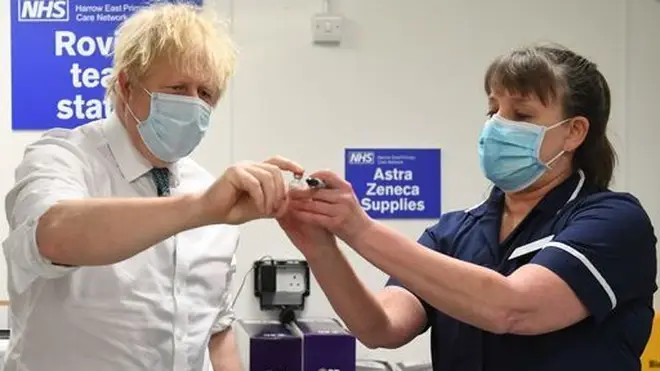
Shelagh Fogarty 1pm - 4pm
26 February 2021, 15:29

The Covid-19 R number for the UK is estimated to be between 0.6 and 0.9, unchanged from last week.
The R value represents the average number of people each person with Covid will go on to infect.
If it is below one, then the number of infections will be declining.
The overall UK estimate of R is estimated to be below 1 and the estimated growth rate means the number of new infections is shrinking by between 2% to 6% every day. For England the latest R estimate is between 0.7 and 0.9.
READ MORE: UK's Covid R number drops slightly to between 0.6 and 0.9
READ MORE: UK's Covid-19 R number drops below 1 for first time since July
These numbers reflect the week leading to February 22, and therefore cannot account for the most recent policy changes or changes in transmission that have not yet been reflected in the data.
The daily numbers of deaths from Covid have been falling in the recent past as people remain in lockdown and contact with others is restricted.

Queen urges those worried about Covid jab to 'think about others rather than themselves'
This week the government launched a new campaign to encourage people to ‘keep going and stay at home’.
Nonetheless, Boris Johnson has revealed his roadmap to get people out of lockdown. It will see schools open on March 8 and no earlier than June 21 will all social contact restrictions be lifted.
It was announced on Friday that the UK vaccination programme has continued progress, people aged 40-49 will be prioritised next for a Covid-19 vaccine, with scientific advisers saying the 'Phase 2' move would "provide the greatest benefit in the shortest time".
READ MORE: Life almost back to normal by 21 June in Boris Johnson's 'roadmap' to freedom
The Joint Committee on Vaccination and Immunisation (JCVI) has considered whether frontline groups such as teachers and police officers should be vaccinated next, but concluded that the most effective way to prevent death and hospital admission is to carry on prioritising people by age.

Caller worries his wife might be able track him via a vaccine passport
It said modelling studies for phase 2 of the vaccination programme also indicate that the speed of vaccine deployment is the most important factor in helping prevent severe illness and death.
This means that in phase 2, priority will be given in the following order:
- All those aged 40-49
- All those aged 30-39
- All those aged 18-29
These groups will be vaccinated once all those in phase 1 (the over-50s and most vulnerable) have received a jab.
Professor Wei Shen Lim, Covid-19 chair for JCVI, said: "Vaccinations stop people from dying and the current strategy is to prioritise those who are more likely to have severe outcomes and die from Covid-19.
"The evidence is clear that the risk of hospitalisation and death increases with age.
"The vaccination programme is a huge success and continuing the age-based rollout will provide the greatest benefit in the shortest time, including to those in occupations at a higher risk of exposure."